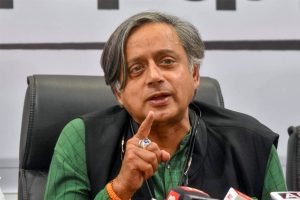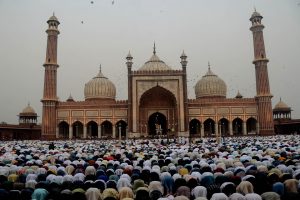Extending greetings to people on the eve of 76th Republic Day, President Droupadi Murmu on Saturday asserted that the ‘One Nation, One Election Bill’ introduced in Parliament promises to redefine the terms of good governance.
Addressing the nation on the eve of Republic Day, the President said the ‘One Nation One Election’ plan can promote consistency in governance, prevent policy paralysis, mitigate resource diversion, and reduce the financial burden, apart from offering many other benefits.
Advertisement
“Reforms of such magnitude require an audacity of vision,” she said.
Mentioning about the new criminal laws in her address, the President said the new laws grant top priority to countering crimes against women and children.
“We won freedom in 1947, but many relics of a colonial mindset persisted among us for long. Of late, we have been witnessing concerted efforts to change that mindset. Among the most noteworthy of such efforts was the decision to replace the Indian Penal Code, the Code of Criminal Procedure and the Indian Evidence Act with the Bharatiya Nyaya Sanhita, the Bharatiya Nagarik Suraksha Sanhita and the Bharatiya Sakshya Adhiniyam. Based also on Indian traditions of jurisprudence, the new criminal laws place the delivery of justice instead of punishment at the centre of the criminal justice system,” Murmu said.
She also spoke about the Constitution in her address.
Murmu stressed that the Constitution serves as the ultimate foundation of India’s collective identity and binds people together as one family.
The President said the Constitution has become a living document because civic virtues have been part of India’s moral compass for millennia.
“The Constituent Assembly, after nearly three years of debates, adopted the Constitution on 26th of November in 1949. That day, 26th November, has been celebrated as Samvidhan Divas, that is, Constitution Day, since 2015. Republic Day is indeed a matter of collective joy and pride for all citizens. Seventy-five years, someone might say, is only the blink of an eye in the life of a nation. No, I will say, not these past 75 years,” she said.
“This has been the time when the long-dormant soul of India has awakened again, taking strides to regain its rightful place in the comity of nations. Among the oldest civilizations, India was once known as a source of knowledge and wisdom. There, however, came a dark phase, and inhuman exploitation under colonial rule led to utter poverty,” she added.
Murmu recalled the brave souls who made great sacrifices to free the motherland from the shackles of foreign rule.
“Some were well known, while some remained little known till recently. We are celebrating this year the 150th birth anniversary of Bhagwan Birsa Munda, who stands as a representative of the freedom fighters whose role in the national history is now being recognised in true proportions. In the early decades of the twentieth century, their struggles consolidated in an organized nationwide independence movement,” she said.
The President said it was the nation’s good fortune to have the likes of Mahatma Gandhi, Rabindranath Tagore and Babasaheb Ambedkar, “who helped it rediscover its democratic ethos. Justice, liberty, equality and fraternity are not theoretical concepts that we came to learn in modern times; they have always been part of our civilisational heritage”.
“It also explains why the critics who were cynical about the future of the Constitution and the Republic when India had newly become independent were proven so thoroughly wrong. The composition of our Constituent Assembly was also a testimony to our republican values. It had representatives from all parts and all communities of the country. Most notably, it had 15 women among its members, including stalwarts such as Sarojini Naidu, Rajkumari Amrit Kaur, Sucheta Kripalani, Hansaben Mehta and Malati Choudhury,” she said.
She said when women’s equality was only a distant ideal in many parts of the world, in India women were actively contributing in shaping the destiny of the nation.
“The Constitution has become a living document because civic virtues have been part of our moral compass for millennia. The Constitution provides the ultimate foundation of our collective identity as Indians; it binds us together as a family,” she said.
“For 75 years now, it has guided the path of our progress. Today, let us humbly express our gratitude to Dr Ambedkar, who chaired the Drafting Committee, other distinguished members of the Constituent Assembly, various officers associated with and others who worked hard and bequeathed us this most wonderful document,” she added.
















